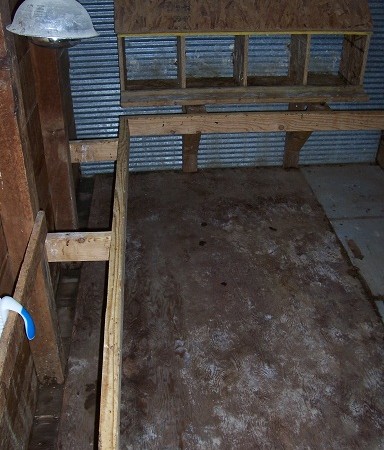

Chicken house cleaning is one of those tasks that is never much fun but must be done regardless. If you have a dirt floor, the job can be even more tedious as you cannot really do much with dirt other than slowly scoop up feces and food waste. An alternative to the work associated with a dirt floor would be opting to install a concrete floor. Concrete floors have both pros and cons associated with them but the benefits seem to far outweigh the disadvantages.
Negatives:
Concrete floors can be cold. In the cold, a concrete floor will not retain as much heat as an earthen floor and will thus be colder on your chickens’ feet. Likewise, in hot seasons it can get hot. You can combat this with bedding, however. Adding a 3-4 inch layer of the bedding of your choice will eradicate the feeling of excessive cold or heat beneath the feet of your flock.
Concrete is hard and can make chicken feet sore. While is very true that standing around on concrete can result in sore feet, bedding can alleviate this problem. If you are already bedding your coop at 3-4 inches deep to combat cold or heat, that same bedding will soften the floor and make it comfortable for your chickens. Of course, you will still have to keep bedding year round in order to maintain the comfort of your flock regardless of the temperature.
Concrete is porous, it can absorb things to a point, but it can also be easily cleaned and treated with vinegar, bleach, of dish soap to remove anything that may be trapped in it. If that is not enough to get the job done, although it should be, there are a multitude of concrete treatments on the market that can make it like new again. Sealing your concrete will also help prevent absorption.
Positives:
Concrete is easy to clean. Barring a major disaster, you should be able to clean your coop easily. Simply sweep out old bedding and, before replacing that bedding, rinse out the coop. You can do this with a hose or even a pressure washer if you wish. Vinegar or bleach can easily be added to your pressure washing solution for quick and easy disinfecting as well.
Concrete floors are predator-proof. If you have a concrete floor that fills your coop from wall to wall, predators cannot dig their way into the coop. That does not mean they will not attempt to find another way in, but that way will not be through your concrete floor.
Concrete is long-lasting and easy to maintain. There will be no need to replace your concrete floor for many, many years to come. Whereas dirt can erode away or be carried out of your coop on your shoes or by other means, that concrete floor is not going anywhere, not even in a fire. Plus, as dirt erodes, your coop structure can become uneven, but you will not have this problem with concrete.
The flooring is the foundation of your coop, so pick one that is ideal for your set up. If dirt is your preference, by all means use dirt. However, if you are open to some of the advantages of a concrete floor, then you may want to invest in one. Your flooring choice should reflect your own personal needs and what works best for you.
 Contact Jaguza Support
Contact Jaguza Support